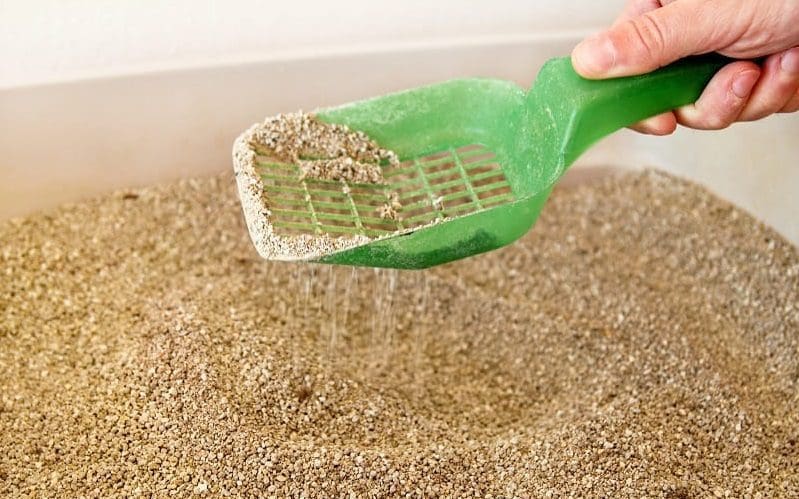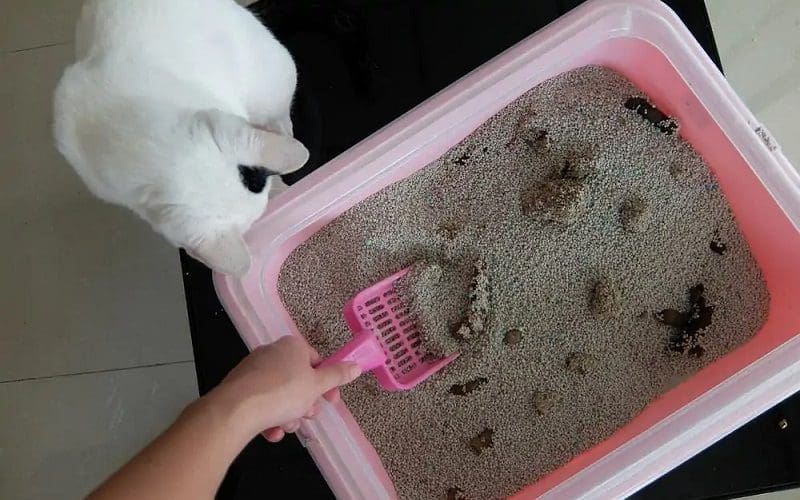Last Updated: 2 months ago
Cats are amazing creatures, and they have become our cute and cuddly pets through 10 millennia of domestication.
However, as many cat owners will have experienced, worms in our feline friends can be quite distressing.
There are 8 types of worms that could become parasites in your cat, and each of them is capable of stealing nutrients from the food it ingests and causing mild to severe health issues like malnutrition.
Your cat can contract worms by ingesting infected feces or coming into contact with parasite eggs, and the most common treatment for this is worming.
Join us as we take a deep dive into the types of worms your cat can contract, the symptoms you should look out for, and all the possible treatments for this condition.
What Are Worms in Cats?

Worms are parasites that attach themselves to a host and begin to compete with them for crucial nutrients.
Consequently, this can cause some health issues for the host. Cats also suffer from the same issue.
As frightening as it is, worms in cats are one of the most common conditions cat owners and veterinarians have to deal with.
When this happens, your cat can look uncomfortable and irritable and may let out yowls or howls every once in a while or repeatedly.
If you don’t pay attention to some crucial signs and symptoms and let these worms run amok in your feline’s intestines and belly, they could develop conditions that can become life-threatening.
Some of these symptoms include malnutrition, intestinal obstruction, or severe anemia.
Types of Worms in Cats
There are eight types of worms you can find in cats, although there are two species that are more common than the rest—tapeworms and roundworms.
Others include the heartworm, lungworm, whipworm, stomach worm, bladder worm, and liver flukes.
Let’s look at these in more detail and see some signs you can use to distinguish between them.
1. Tapeworm
Not only can tapeworms get into cats, but they can also get into humans, cows, and many other mammals.
Unsurprisingly, tapeworms are one of the two most common worm species that cats can contract. They are flat and ribbon-shaped, which allows them to hide well inside your cat.
Due to the fact that they get most of their nutrients from parasitic behavior, they mostly mature inside your cat’s intestine.
Occasionally, pieces of itself break away and are expelled through feces. We suggest that you look through your cat’s stool and check around the anus if you’re concerned about a tapeworm infection.
2. Roundworms
Roundworms are the most common intestinal parasites found in cats.
However, the good news is that it’s large enough for you to see without a microscope or other equipment.
These worms can grow up to 5 inches long and look interestingly similar to spaghetti strands and worms we see in soil.
Like tapeworms, they can be found in your cat’s feces. You may find these parasites dead or alive in the stool.
They steal nutrients from the food your cat eats, which, after a long time, can cause some health complications.
3. Hookworm
As the name implies, these worms have hooks they can use to latch onto your cat’s intestines and stomach.
Unlike tapeworms and roundworms, this species feeds on blood and mucosa.
The major ways cats get them are when they ingest them, when larvae infiltrate their body from cuts on their skin, or while they’re still in their mother’s womb.
Although they’re less common than other types of worms, they’re often referred to as the most deadly because they cause intestinal bleeding.
4. Heartworm
When these worms get into your cat’s body, they go after its blood vessels, lungs, and heart.
If a worm-carrying mosquito bites your cat, then there’s a high chance that your feline may have contracted this type of worm.
5. Stomach Worms
This one is quite hard for your cat to contract because of the mode of transmission.
Your cat can only get this type of worm from another cat’s vomit. Luckily, a vet can easily detect and treat this condition.
6. Bladder Worms
Bladder worms virtually attach themselves to your cat’s urinary tract and, as a result, are difficult to detect.
Once attached, worms in cats can cause urinary tract infections and mild-to-severe discomfort.
However, after general treatment, your cat should be able to pass it out through their urine.
7. lungworm
Lungworms are parasitic worms that primarily affect the respiratory system of cats.
They are transmitted through the ingestion of infected snails, slugs, or contaminated water sources. Once ingested, the larvae migrate to the lungs, where they develop into adults and lay eggs.
This can lead to symptoms such as coughing, wheezing, and difficulty breathing.
8. Whipworms
Whipworms are also as dangerous as hookworms because they act fast and are easy to contract.
Cats can contract them from water, soil, feces, animal flesh, and food that contains their eggs.
If these worms are not taken care of, they can remain in your cat’s body for up to 16 months. When infected, your cat may lose weight, vomit frequently, or even have bloody diarrhea!
How do cats get worms?

Cats get worms primarily through contact with the eggs of any of the worms mentioned above. These eggs are commonly found in poop, vomit, ticks, food, soil, water, and even their own fur!
Interestingly enough, your cat can also contract these worms when they eat the flesh of any infected animal.
So, the next time you see your furry feline friend bring a dead rodent, reptile, or bird to you, make sure you take some preventative measures that will stop the potential eggs from maturing.
It’s quite difficult to avoid because your cat won’t be able to see most of these parasites.
However, as soon as cats ingest these worms, they take weeks to mature and can survive in their stomachs and intestines for more than a year.
Symptoms of Worms in Cats
Although worms in cats share a lot of symptoms with other conditions, there are a few symptoms that set them apart from other diseases.
In some cases, your cat may be asymptomatic; they may not exhibit any signs of worms in their body.
However, if you’re suspecting that worms are affecting your cat, here are some things to watch out for:
- Diarrhea (it may or may not be bloody)
- Weight loss
- Skin lesions
- Weakness
- Dehydration
- Vomiting.
If your cat shows more than two of these symptoms, it’s best to “deworm” them or take them to the vet.
You can deworm them at home by purchasing some medication from any pharmaceutical store nearby.
A good recommendation is the Oral Pro pyrantel pamoate oral suspension, which acts as an all-round dewormer.
If you’ve gotten a diagnosis from your vet and it turns out to be tapeworms, we recommend you get the Elanco tapeworm dewormer. It’s easy to apply and also doubles as a flea preventer!
Signs of Worms in Cats

As thorough as your examination will be, you won’t be able to detect some less subtle signs your cat may exhibit.
Your vet may be able to notice these less obvious signs:
- Low blood pressure.
- Shock.
- Unusually pale or white gums (this is a sign of anemia).
- A swollen abdomen.
- Intestinal obstruction.
- When the infection gets more severe, pneumonia occurs.
When you notice these signs, they can advise you on the next steps to take to preserve your cat’s health.
How to treat worms in cats
Worms in cats are extremely common, but, thankfully, they’re easy to treat and are rarely fatal.
Buying deworming medication is the most effective way to treat a worm infestation in your cat.
As soon as you administer this medication to your cat, it targets and kills both the adult worms and their larvae. It’s best to get a prescription from your vet and follow it religiously.
Some cases may only require your cat to take a small amount in a single dose, while other cases may require your cat to take a moderate amount in multiple doses.
This multiple-dose treatment is typically administered to make sure that newly-hatched worms are also killed.
If you’re having trouble administering this dosage (it most commonly comes in the form of a pill), we recommend that you hide the pill or crush it in your cat’s food.
How to Get Rid of Worms in Cats

As mentioned earlier, the best way to treat and get rid of worms in cats is by purchasing deworming medication and following a strict prescription from your vet.
However, in some extreme cases of intestinal blockage, the only way to get rid of this problem would be surgery.
After getting rid of this parasite, you can prevent it from coming back by frequently cleaning their litter and poop made by other pets you may have, making sure their food and water are clean, and even discouraging your cat from hunting small animals.
Also, make sure to check for fleas on a regular basis to prevent your cat from eating one infected with worm larvae.
Furthermore, it’s best to keep your cat’s nails clean in order to reduce the chances of your feline ingesting these microscopic eggs.
FAQ
Can worms live outside a cat’s body?
Worms can live outside a cat’s body for a long period of time. Although they are parasitic (they heavily rely on another animal for survival), they can also lie in wait for unsuspecting animals to ingest them. In fact, a study even shows that their eggs can also lay dormant for months!
Can humans catch worms from cats?
Humans can catch worms from cats through direct contact with eggs found in their poop, fur, or vomit. When cleaning up their excrements, make sure you wash your hands thoroughly after and again before you ingest any food or water.
Can other pets catch worms from cats?
Other pets, like canines, can also catch worms from cats by ingesting an infected cat’s vomit or poop. In fact, it’s the main mode of transmission, so we recommend cleaning up after your feline immediately after they make a mess.
Wrap-Up
Cats are energetic and curious, which are qualities that can make them contract worms (through no fault of their own, of course).
If you see any of the signs or symptoms mentioned above, make sure you purchase a dewormer and visit your vet immediately. Ignoring these symptoms can lead to more severe symptoms that may be fatal.
The main mode of transmission is through direct contact, so make sure you properly wash your hands after cleaning your feline’s mess.

Dr. Linda Simon MVB MRCVS is a locum veterinary surgeon who has worked in London for the past 8 years. She graduated top of her class in small animal medicine from UCD, Dublin. She is currently a member of the Royal College of Veterinary Surgeons. Linda is the resident vet for Woman magazine and a frequent contributor to People’s Friend Magazine, the Dogzone website, Vet Help Direct and Wag! Linda also writes content for the CVS veterinary group, Vetwriter and a number of other establishments.
